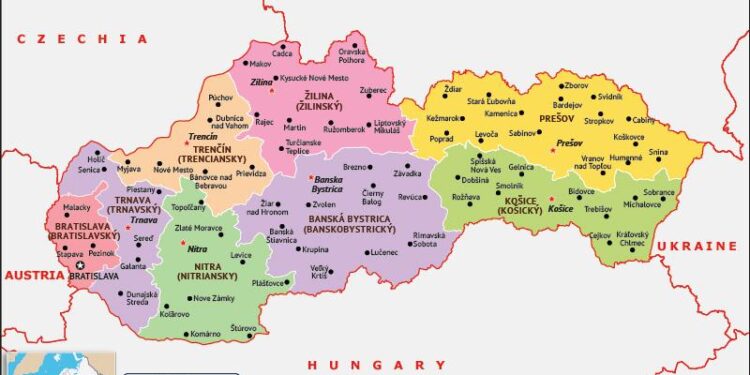Slovakia may consider approving new European Union sanctions on Russia, provided specific conditions are fulfilled, according to recent statements by former Prime Minister Robert Fico. Speaking in an exclusive interview with UNITED24 Media, Fico emphasized that Slovakia’s support hinges on meeting certain demands aimed at safeguarding national interests and economic stability. This development signals a potential shift in the country’s stance within the EU amidst ongoing tensions between Russia and Western nations.
Fico Signals Conditional Support for New EU Sanctions Against Russia
Slovakian Prime Minister Robert Fico has signaled a potential shift in his stance regarding the European Union’s approach to sanctions on Russia. While historically critical of blanket economic sanctions, Fico recently indicated that Slovakia might support the next wave of EU sanctions – but only if specific conditions and national interests are acknowledged. He emphasized that any new restrictive measures must not disproportionately impact Slovakia’s economy or energy security, highlighting the delicate balance between solidarity within the EU and safeguarding domestic wellbeing.
Key demands outlined by Fico include:
- Clear exemptions for Slovak energy imports to prevent supply disruptions
- Compensation mechanisms for sectors that could suffer financially
- A defined timeline and clear criteria for evaluating the effectiveness of sanctions
| Condition | Impact |
|---|---|
| Energy import exemptions | Protects national supply stability |
| Sector-specific aid | Mitigates economic losses |
| Evaluation timeline | Ensures accountability |
Key Demands Outlined for Slovakia’s Approval of Further Sanctions
Slovak Prime Minister Robert Fico has set forth a clear framework of conditions that must be satisfied before Slovakia endorses any further European Union sanctions against Russia. Central to these demands is the assurance of energy security for the country, emphasizing uninterrupted access to affordable gas and oil supplies. Fico also stressed the need for compensation mechanisms to mitigate economic repercussions faced by Slovak businesses affected by existing and prospective sanction regimes.
In addition to economic safeguards, Slovakia is calling for stronger diplomatic efforts to engage Russia in dialogue aimed at conflict resolution. The government highlighted the importance of aligning sanctions with a broader EU strategy that supports stability and peace in the region. The key points outlined include:
- Guaranteeing energy imports without disruption
- Financial support for industries impacted by sanctions
- Clear benchmarks for lifting sanctions tied to diplomatic progress
- Enhancing EU solidarity to distribute economic burdens evenly
| Demand | Purpose | Expected Outcome |
|---|---|---|
| Energy Supply Guarantee | Protect national energy security | Stable prices, no shortages |
| Compensation Fund | Offset economic impacts | Support for affected sectors |
| Diplomatic Engagement | Encourage conflict resolution | Pathway to easing sanctions |
Experts Recommend Close Monitoring of Impact on Slovak-Russian Economic Relations
Leading economists and policy analysts emphasize the necessity for continuous scrutiny of the evolving economic ties between Slovakia and Russia amid the possible introduction of new EU sanctions. They highlight that any abrupt changes could significantly disrupt bilateral trade flows, energy supplies, and investment projects, which are already sensitive to geopolitical tensions. Experts are urging Slovak authorities to establish clear monitoring frameworks that can quickly assess the immediate and long-term consequences on key industries such as:
- Energy and natural gas imports
- Automotive and manufacturing sectors
- Financial services and banking cooperation
- Agriculture and raw materials exchange
Additionally, a recent analysis tabled by economic think tanks underlines the importance of transparent communication channels between Slovak policymakers and EU decision-makers to mitigate risks effectively. Below is a concise overview of potential economic impact areas requiring vigilant attention:
| Sector | Potential Impact | Recommended Action | ||||||||||
|---|---|---|---|---|---|---|---|---|---|---|---|---|
| Energy | Supply volatility, price increases | Diversify sources, enhance storage | ||||||||||
| Manufacturing | Supply chain delays, higher costs | Develop alternative suppliers | ||||||||||
| Trade | Decreased export volumes | Leading economists and policy analysts emphasize the necessity for continuous scrutiny of the evolving economic ties between Slovakia and Russia amid the possible introduction of new EU sanctions. They highlight that any abrupt changes could significantly disrupt bilateral trade flows, energy supplies, and investment projects, which are already sensitive to geopolitical tensions. Experts are urging Slovak authorities to establish clear monitoring frameworks that can quickly assess the immediate and long-term consequences on key industries such as:
Additionally, a recent analysis tabled by economic think tanks underlines the importance of transparent communication channels between Slovak policymakers and EU decision-makers to mitigate risks effectively. Below is a concise overview of potential economic impact areas requiring vigilant attention:
|
















